Last Updated on January 6, 2025
Scuba diving while pregnant is generally not recommended. The risks to both the mother and the unborn child outweigh the potential benefits.
Pregnancy brings many changes to a woman’s body, including physiological adaptations. These changes can affect how the body responds to pressure and oxygen levels underwater. As a result, scuba diving poses significant risks during pregnancy, including decompression sickness and impaired oxygen supply to the fetus.
Many health experts advise against diving, especially in the later stages of pregnancy. Expecting mothers should prioritize safety for themselves and their baby. Exploring alternative activities, like snorkeling or swimming in calm waters, may be a safer choice. Always consult with a healthcare provider before engaging in any underwater activities during pregnancy.
Safety Concerns For Pregnant Divers
Scuba diving during pregnancy raises several safety concerns. Understanding these risks is crucial for the health of both mother and baby. Pregnant women must weigh the benefits against potential dangers.
Risks Involved
Scuba diving poses specific risks for pregnant divers. Here are some key concerns:
- Decompression Sickness: Pregnant women face a higher risk.
- Pressure Changes: Changes in pressure can affect the fetus.
- Increased Heart Rate: Diving can elevate heart rates significantly.
- Hypoxia: Low oxygen levels can harm both mother and baby.
Each of these risks can lead to serious complications. Pregnant women should consult with healthcare providers before diving.
Medical Opinions
Healthcare professionals have varied opinions on diving during pregnancy. Here’s a summary of common views:
| Medical Professional | Opinion |
|---|---|
| Obstetricians | Generally advise against scuba diving. |
| Pediatricians | Express concerns about fetal development. |
| Dive Instructors | Encourage caution and highlight safety protocols. |
Consulting with healthcare professionals is vital. Decisions should prioritize safety for both the mother and child.
Guidelines For Scuba Diving During Pregnancy
First Trimester Precautions
Limit diving due to rapid fetal development.
Depth And Duration Limits
Avoid dives deeper than 30 feet or longer than 30 minutes.
Alternatives And Precautions
Pregnancy brings joy but also requires careful choices. Many expectant mothers wonder about safe activities. Scuba diving is risky during pregnancy. Exploring other water activities is wise. Understanding alternatives helps ensure safety.
Non-diving Water Activities
There are many fun, safe water activities. These allow you to enjoy the water without diving. Consider the following options:
- Swimming: Enjoy gentle strokes in a pool or calm ocean.
- Snorkeling: Explore shallow waters with a mask and fins.
- Kayaking: Paddle on calm lakes or bays.
- Water Aerobics: Join classes designed for low-impact exercise.
- Paddleboarding: Balance and enjoy serene waters.
Always choose calm waters. Avoid strong currents or waves. Stay within your comfort zone.
Post-pregnancy Diving Considerations
Diving after pregnancy needs careful thought. The body changes during pregnancy. Waiting before diving is important. Here are key points to consider:
| Consideration | Details |
|---|---|
| Wait Time | Consult a doctor. Wait at least 6-8 weeks. |
| Health Check | Ensure physical readiness before diving. |
| Hydration | Stay well-hydrated before and during dives. |
| Buddy System | Dive with a buddy for added safety. |
Always prioritize safety. Listen to your body. Enjoy water activities that feel comfortable.
Frequently Asked Questions
Can Pregnant Women Scuba Dive Safely?
Pregnant women should avoid scuba diving due to potential risks, including decompression sickness and oxygen toxicity.
What Are The Risks Of Diving While Pregnant?
Risks include fetal harm, reduced oxygen delivery, and increased chance of complications during pregnancy and diving.
Is Snorkeling Safe During Pregnancy?
Snorkeling is generally safer than scuba diving, but caution is advised. Always consult a healthcare provider first.
At What Stage Of Pregnancy Is Diving Risky?
Diving is risky throughout pregnancy, especially in the second and third trimesters due to increased fetal vulnerability.
What Should Pregnant Women Do Instead Of Diving?
Pregnant women can enjoy safe alternatives like swimming, beach activities, or relaxing on the shore.
Conclusion
Scuba diving during pregnancy poses significant risks for both mother and baby. Experts generally advise against it due to potential complications. Prioritizing safety and health is crucial during this special time. Always consult a healthcare professional before making any decisions related to diving or travel while pregnant.








